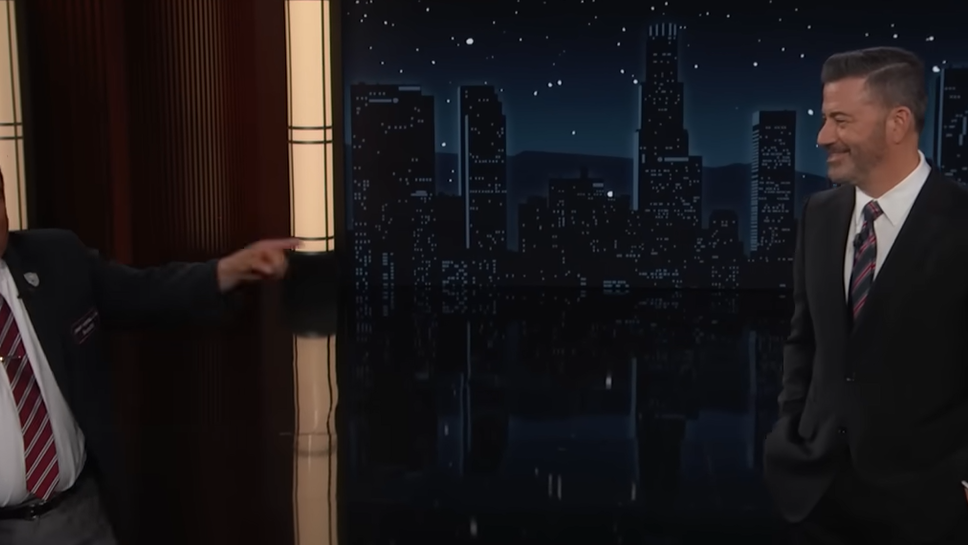The thunderous applause that greeted Jimmy Kimmel’s return to the Jimmy Kimmel Live! stage following his week-long suspension was almost cathartic, acting as a release valve for months of tension in late-night television in the United States. His nearly 18-minute comeback monologue was incredibly powerful and poignant, striking a balance between defiance and apology that few performers are able to do when under duress. While defending satire as vital to democracy, he wept as he paid tribute to the family of Charlie Kirk, the conservative activist whose tragic murder had led to his suspension.
ABC had presented the suspension as an attempt to defuse the situation after Kimmel likened Donald Trump’s response to Kirk’s passing to a child’s grief over a goldfish. Many saw the suspension as a risky precedent, while others thought the comment was insensitive. During the controversy, Disney’s stock lost almost $5 billion in value. Although the remarkably similar reaction brought to mind times when other comedians, such as Dave Chappelle and Kathy Griffin, experienced surges of public indignation, Kimmel’s stakes were particularly corporate—he was not only a late-night host but also a representative of Disney’s larger entertainment conglomerate.
His position had significantly improved by the time he returned due to pressure from all sides. Barack Obama shared articles supporting free speech, reminding readers that satire, whether expressed by political allies or opponents, is protected by the First Amendment. In an unexpectedly supportive move, Senator Ted Cruz charged that FCC Chairman Brendan Carr was behaving like “a mafioso” by putting pressure on Disney to keep Kimmel quiet. His reinstatement was especially potent because of that uncommon bipartisan defense, which showed that even in divisive times, the right to joke, regardless of how offensive some may find it, is a universal value.
Table: Jimmy Kimmel Bio, Career, and Professional Information
| Category | Details |
|---|---|
| Full Name | James Christian “Jimmy” Kimmel |
| Date of Birth | November 13, 1967 (Age 57) |
| Birthplace | Brooklyn, New York, USA |
| Occupation | Television Host, Comedian, Writer, Producer |
| Notable Show | Jimmy Kimmel Live! (2003–present) |
| Suspension Incident | September 2025, following comments on Charlie Kirk’s murder |
| Return to TV | September 23, 2025, after ABC reinstated the show |
| Parent Company | ABC/Disney |
| Net Worth (est.) | Approx. $50 million |
| Authentic Profile | Jimmy Kimmel – Wikipedia |

The calculation was as much business as principle for ABC and Disney. Using hashtags like #CancelDisney, thousands of viewers started terminating their Disney+ and Hulu subscriptions, indicating that there would be financial repercussions for keeping Kimmel quiet. Eventually, the company acknowledged that it had had “thoughtful conversations” with him, demonstrating that this was about a network’s credibility rather than just one comedian’s remarks.
A more general reality was highlighted by Kimmel’s comeback: late-night television has evolved beyond simple entertainment. Light comedy has given way to cultural commentary over the past ten years, with hosts like Stephen Colbert, Trevor Noah, and Seth Meyers influencing discussions in ways that were previously only possible for journalists. Kimmel, who has always combined humor and emotion in his writing, is now seen as a person whose opinions can influence political narratives and ratings. He is a cultural icon and a highly versatile entertainer because of his ability to combine comedy and morality.
Additionally, he displayed personal vulnerability in his monologue by acknowledging that his remarks might have come across as “ill-timed or unclear,” but he refused to take back his broader criticism of political spin. That duality—humility and resolve—was incredibly effective at motivating supporters and disarming detractors. Although Robert De Niro’s satirical portrayal of the FCC’s Brendan Carr as a mob boss in a skit was incisive, Kimmel’s occasionally cracked voice felt the most enduring. It served as a reminder to viewers that satire has always been about reflecting society’s contradictions back at itself, not just making people laugh.
It should come as no surprise that Trump responded with contempt. He criticized Disney for bringing back Kimmel on Truth Social, labeling the program “99% Democrat garbage.” However, his rage only served to highlight the fact that late-night satire is still relevant and has the power to influence headlines and provoke presidents. Kimmel himself recognized the dangers for Disney when he said, “The president can’t take a joke,” a particularly creative statement that was straightforward but nuanced in meaning.
The fact that Kimmel’s return struck a chord with audiences of all demographics has significantly enhanced its broader cultural impact. While older viewers recognized echoes of previous television moments where entertainment collided with political scandal or national grief, younger viewers saw him as a figure standing against censorship. His return was more than just a humorous one; it served as a reminder that satire, like journalism, thrives on its capacity to subvert the status quo.

